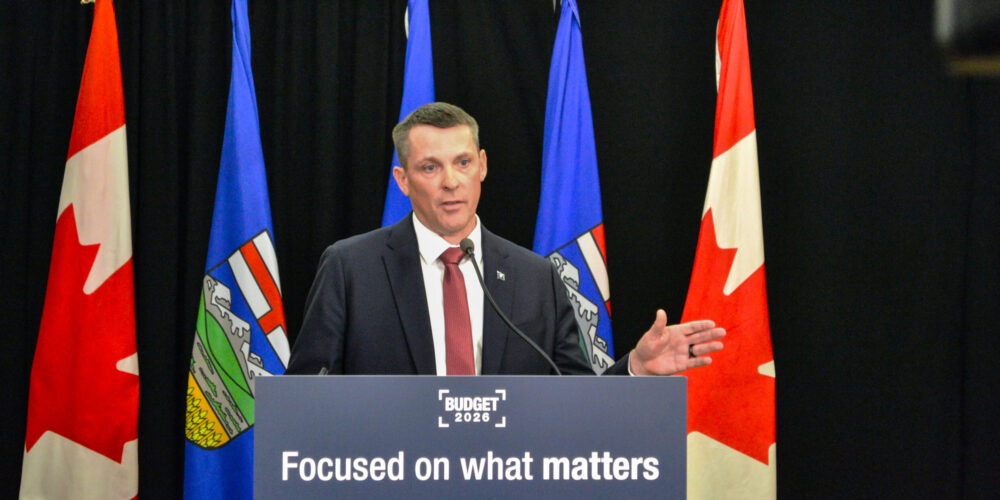Half of Alberta post-secondary students surveyed experienced sexual violence, report finds
The Government of Alberta released a report detailing the experiences of 12,948 students across Alberta regarding sexual and gender-based violence.
 Lily Polenchuk
Lily PolenchukTrigger Warning: This article discusses sexual and gender-based violence, which some readers may find upsetting. Resources are listed at the end of this article.
On August 30, the Government of Alberta released the Sexual and Gender-Based Violence in Alberta Post-Secondary Education report. The report, created by analytics company Leger, found that 50 per cent of Albertan post-secondary students surveyed have experienced sexual or gender-based violence.
From January 30 to March 16, 12,948 post-secondary students across 26 publicly-funded Alberta post-secondary institutions (PSI) completed the survey. The survey’s response rate was 5.8 per cent. The report, commissioned by the Campus Climate Survey on Sexual and Gender-based Violence Working Group, seeks to “better understand the climate of sexual and gender-based violence.”
Students at comprehensive academic and research universities responded the most, totalling 5,745. Undergraduate universities had the second-most responses at 2,600. Polytechnic institutions were third at 2,112 responses.
The report found that the “most common form of sexual and gender-based violence that students experience” is sexual harassment. Of those surveyed, 45 per cent of students said they experienced sexual harassment since starting post-secondary. Women, 2SLGBTQIA+ individuals, and people with disabilities are more likely to have experienced sexual or gender-based violence.
As well, the report found that 47 per cent of respondents believe there are supports available on campuses. In addition, 43 per cent of students “are satisfied with current institution supports or believe no additional ones are needed.” However, the report found that students who have experienced sexual or gender-based violence “overwhelmingly” do not access the supports offered at their universities.
“The ministry told us the funding would come after they have the numbers. We now have the numbers,” Beasley says
In a press release sent out on August 30, the Council of Alberta University Students (CAUS) called for the provincial government to “increase funding for critical services such as consent training and on-campus sexual assault centres.” CAUS represents the interests of over 114,000 university students in Alberta.
Chris Beasley, CAUS chair and University of Alberta Students’ Union (UASU) vice-president (external), said “that we need urgent action from this provincial government.” He added that action needs to come in the form of increased funding.
“The way that we achieve prevention is through changing culture. The way that we change culture, frankly, costs money. It costs money that the university doesn’t have when it’s this emaciated from cuts.”
CAUS has three main objectives it wants the Government of Alberta to work toward, Beasley said. Firstly, it wants funding for programs that would encourage change to campus culture. As well, it wants funding for sexual assault centres.
Lastly, it wants the Government of Alberta to create a working group with “student leaders and community partners to draft a set of trauma-informed and survivor-centric recommendations out of the results of this report.”
“Really, that’s what we need from the ministry [of education]. The ministry told us the funding would come after they have the numbers. We now have the numbers,” Beasley said.
UASU planning a Consent Awareness Week, vice-president (student life) says
According to Michael Griffiths, UASU vice-president (student life), the UASU is planning a Consent Awareness Week for September 18-22. Consent Awareness Week will be “a campaign to raise awareness of consent culture and what that means,” Griffiths said.
Griffiths said the UASU plans to “call [on] the provincial government to enshrine Consent Awareness Week across the province.” They mentioned that other provinces, such as Ontario, have adopted this practice.
“We want to get on that train and make sure that Alberta as a whole — and us as a leader in the institution space — are recognizing Consent Awareness Week,” Griffiths said. “That proclamation is being pushed to the provincial government to start recognizing this and take that advocacy province-wide.”
Griffiths thinks this report “didn’t really come as a surprise” to students. However, he hopes it will finally result in action.
“We’re hoping … that because it’s no longer a surprise, we will see some really tangible and meaningful action to address the crisis.”
During his term as vice-president, Griffiths plans to “push the institution to fund the Office of the Sexual and Gender-based Violence Response Coordinator, [and] ensure that their contract is committed to long-term.”
People becoming more comfortable disclosing their experiences with sexual and gender-based violence, Eerkes says
Deb Eerkes, the U of A’s Sexual Violence Response Coordinator in the Office of the Provost, said she was unsurprised by the statistics. However, she explained that because the survey was voluntary, it “means you can’t say x per cent of all university students” have experienced sexual or gender-based violence.
As well, she doesn’t believe the amount of people experiencing sexual or gender-based violence is necessarily going up. Instead, she thinks more people feel comfortable disclosing their experience. Eerkes mentioned how the #MeToo movement, which gained prominence in 2017, helped encourage people to come forward about their experiences.
“So, the number of disclosures goes up, not necessarily the number of people who have been sexually harassed or assaulted. It’s more that they feel like, ‘oh, I know now that I can talk about it.’”
41 per cent of those affected didn’t believe their experience was serious enough to seek supports, survey finds
For Eerkes, some statistics from the report did stick out. Of the students who experienced sexual or gender-based violence, 37 per cent “did not want or need any assistance.” As well, 37 per cent “wanted to forget about it and move on.”
However the survey found that 41 per cent of respondents didn’t report their experiences because “they didn’t think it was serious enough,” Eerkes said.
“That might be because of stigma. That might be because they are working through things very quickly. It also might be that they just don’t want to seek support.”
“One of the things that we can learn from this is that we have to trust survivors to look for support when they need it, and not pressure them to tell people about it when they don’t want to,” Eerkes said.
One statistic that Eerkes felt was “good news” was that 85 per cent of people affected told a friend about their experience.
“Whether they seek [support] from the university, their family, or friends, it doesn’t matter. As long as they’re seeking that support.”
As of right now, Eerkes is working to roll out the Options Navigation Network. This program would give students “correct, current, [and] accurate information about where to seek help.”
Eerkes is developing the training for the staff of this network. It is the same training that anyone directly involved in addressing campus violence will receive. This became required when the U of A’s Sexual and Gender-Based Violence Policy was edited in 2022.
Funding necessary to develop programs to prevent sexual and gender-based violence, Eerkes says
Although she is focused on developing an adequate response to sexual and gender-based violence, Eerkes emphasized the need for prevention.
She mentioned that 77 per cent of respondents had experienced sexual or gender-based violence before entering post-secondary education. She thinks prevention efforts should be made “at a much earlier stage than university.”
Eerkes said that supporting perpetrators in changing and holding themselves accountable for their actions would be valuable. However, proper funding is necessary.
“There are all kinds of ways in which we could rethink the way we address, talk, and think about sexual and gender-based violence. But, that does require a shift in thinking first,” Eerkes said. “And then, if we did take a restorative, transformative approach, we [would] need more funding to do that.”
The report has also shown Eerkes that students want to learn about sexual and gender-based violence. She said there is interest in learning how to intervene as a bystander. As well, how to react when someone tells them about their experiences. However, Eerkes also wants to hear from students and learn how the university can improve.
“I want to know what students have experienced when they approach the university. Or when they try to use some of our resources. I want to know what they think is missing.”
For crisis support during The Sexual Assault Centre’s operating hours, visit 2-705 SUB, phone 780-492-9771, or email [email protected].
The Sexual Assault Centre of Edmonton‘s Support and Information Line is available from 9 a.m. to 9 p.m., seven days a week, 365 days a year.
Alberta’s One Line for sexual violence is a toll-free phone, text, and chat service, private and available throughout Alberta from 9 a.m. to 9 p.m. daily. Call or text 1-866-403-8000.
The Central Alberta Sexual Assault Support Centre provides 24-hour phone and text support at 1-866-956-1099.




